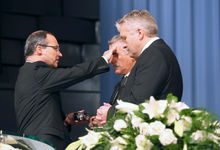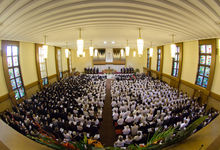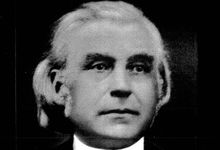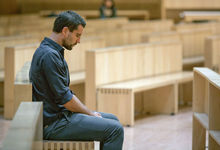The living and the dead: a fellowship in Christ
The New Apostolic Church’s construct of the departed raises questions. In what condition do the dead find themselves? Why do they need the sacraments? And does all of this not have something to do with Spiritism? Answers to an unusual doctrine.

The practice of the New Apostolic Church to administer the sacraments to the departed is unique in Christianity. This is something that goes back to the time of Apostle Friedrich Wilhelm Schwartz. The catalyst had been the death of a child in 1872 which had not been baptised. The parents had been very concerned about the salvation of their child.
Already at the time of the first Christians there were references to such acts. The Bible reports that some were baptised on behalf of the dead. A core element of our construct for the departed realm is the belief in God’s universal will to save: God desires all men to be saved.
In what condition do the dead find themselves?
The New Testament and the New Apostolic faith that is based upon it are both very cautious in the statements they make about the world of the departed. What is certain is the following: the personhood of an individual remains intact even in death. The departed individual is unique and distinctive, and remains an individual being loved by God.
The general view is that death does not change the condition of a soul as such—neither its nearness to God or remoteness from Him. The New Apostolic faith, however, disputes the conceptions of other denominations that the departed can no longer change the attitude toward God which they had assumed in life. On the contrary, those departed souls who find themselves in a condition of remoteness from God need special care in the form of intercession.
Why are the dead dependent on the sacraments?
The state of being a Christian is rooted in the sacraments and reinforced by them. Therefore baptism is absolutely necessary as it constitutes God’s yes to the individual. Anyone who wishes to receive salvation, whose faith is to be strengthened and maintained, is dependent on receiving the sacraments.
According to New Apostolic conviction, the dispensation of the sacraments leads to a change in the condition of the departed. This does not mean of course that we rebaptise souls who were not New Apostolic or that souls who are being sealed are made into New Apostolic Christians.
Does our construct of the realm of the departed have anything to do with Spiritism?
Modern Spiritism came into being in the nineteenth century. The idea was to find a way to take up contact with the dead and ask them, for example, about the condition in which they find themselves and what the world of the beyond is like.
Necromancy, a central element of Spiritist practice, was already mentioned in the Old Testament, as Spiritism was part of the religious practice of the pagan environment of Israel. Biblical reports which testify of such practices—such as the account of the witch of En Dor—are no intended to substantiate the possibility of necromancy, but rather to demonstrate how far the people had already distanced themselves from God. The Bible emphatically rejects all forms of necromancy.
Our practice as concerns the departed does not endeavour in any way to make contact with the dead in order to learn more about them or the beyond. Here God merely makes use of human beings—namely the Apostles—to ensure that the sacraments can be accessed by the souls of the departed.
Our understanding of the departed therefore does nothing more than clearly express God’s universal will to save, which encompasses both the living and the dead. This also brings to expression the certainty that the church of Christ itself is a fellowship comprised of both the living and the dead.
Further explanations on the subject are found in the latest edition of “community”, No. 01/2018. The fundamentals of our conception of the departed are explained in the previous issue of “community”, No. 04/2017.
Photo: bellan / Fotolia
Article info
Author:
Date:
Keywords:
Andreas Rother
03.01.2018
divine services for ministers,
Doctrinal statements












